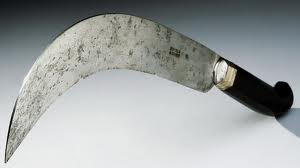 |
| Paré was one fine guy |
Paré was born in a country town in France in 1510 and because he was born into a poor family he only received a basic education and was not taught Greek or Latin - the languages used by Scholars and Doctors. He grew up to be a barber's assistant - this was the first step to becoming a fully fledged doctor. Overtime Ambroise became progressively more interested in the medical side of the barber profession. In 1529 he decided that he wanted to become a fully-fledged doctor, he knew the best medical schools were in Paris, so he traveled there.
 Three years later, when France went to war, Paré was hired as a surgeon. In the 1500's it was believed that powder burns from gunshots were poisonous, so they would pour boiling oil into the wound - which was, quite obviously, extremely painful. Paré was following the standard procedure when a fearful battle broke out and Paré ran out of oil, he had to treat the wounds somehow, so in desperation he made an ointment of egg yolk, oil of roses and turpentine which he applied to the wound. He blamed himself for running out of oil and worried throughout the night about the men, he expected them to die. The next morning he made rounds and to his great relief found that the men who had received his ointment had rested more comfortably than those who had received the boiling oil. Paré came to the conclusion after seeing the result of the two treatments that he would never again treat with boiling oil. He also thought back to Hippocrates, who taught that doctors should avoid harsh remedies.
Three years later, when France went to war, Paré was hired as a surgeon. In the 1500's it was believed that powder burns from gunshots were poisonous, so they would pour boiling oil into the wound - which was, quite obviously, extremely painful. Paré was following the standard procedure when a fearful battle broke out and Paré ran out of oil, he had to treat the wounds somehow, so in desperation he made an ointment of egg yolk, oil of roses and turpentine which he applied to the wound. He blamed himself for running out of oil and worried throughout the night about the men, he expected them to die. The next morning he made rounds and to his great relief found that the men who had received his ointment had rested more comfortably than those who had received the boiling oil. Paré came to the conclusion after seeing the result of the two treatments that he would never again treat with boiling oil. He also thought back to Hippocrates, who taught that doctors should avoid harsh remedies..jpg) |
| An ornate surgeon's knife that was used for amputating limbs |
Another astounding discovery of Paré's was the tourniquet. Many soldiers would require amputations, and would survive the actual amputation but would die from shock from the hot iron that was applied to cauterize the wound, so one day, Paré tied off the blood vessels instead with cotton thread, this worked better than the hot iron.
Paré was not liked by other doctors, and so, after his new-found fame from the alternative treatment for amputations he wrote a book, but Doctors resented him, so found an old law that prevented it from being published for four years. When it was though, it sold out.
Well, I apologise for the brusque writing, exams are looming and though I find it enjoyable being back here I cannot ignore the requirement to go and learn things. I thank all of you who have returned after my long absence, and those who are new. I hit 600 page views, lets see if we can reach 1000!
See you soon.
I promise.
No really.
I wouldn't lie.